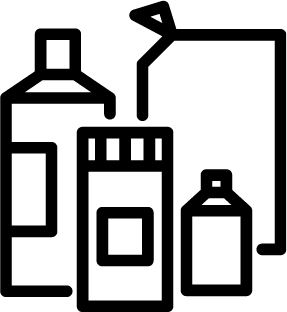FAQs — Natural Stone Paving
I have children/pets/overhanging trees – is natural stone suitable for my garden?
There is a natural stone solution for every project. Your sales advisor will be able to assist in helping you to choose the best product to suit your lifestyle. In this situation, we strongly advise that natural stone is sealed to assist with maintenance and cleaning in the future and this is even more important in high-traffic areas.
Is natural stone better than concrete?
These are two entirely different products but there are some advantages to using natural stone over concrete. Natural stone will weather naturally over time, often getting better with age, whereas concrete can lose its original colour fairly quickly. If a concrete paver is chipped or damaged then unsightly concrete and aggregate will be left on display, unlike natural stone which is a consistent colour throughout the depth of the slab.
Do London Stone have a showroom I can visit?
We have the best natural stone display centres in the country and we strongly encourage all customers to visit one of the showrooms if at all possible. There is no substitute for seeing the stone installed and pointed; it will give you a much better idea of what you’re buying than you will be able to glean from a photo or a small sample. You can also speak with our expert sales advisors who can help with any questions you may have. Our showrooms are based in the home counties – find your nearest branch here.
Is natural stone suitable for my driveway?
We supply a lot of stone for driveways and our sales advisors can help you choose a suitable product. Something hardwearing and dense such as slate, granite or basalt is a good choice as it will be easier to maintain, whilst the darker colour will help to disguise the odd oil droplet or tyre mark. We strongly advise that any type of stone used on a driveway is sealed prior to application with one of our Dry Treat products. You will also need to install a deeper sub-base for a driveway. Please speak with your sales advisor for further information.
Does natural stone retain its original colour indefinitely?
Over a period of time exposed to the elements, your stone will weather which often involves some level of colour change. This is a positive characteristic and natural stone looks all the better for age. Some stones are more prone to colour changes than others. For example, Jura Beige Limestone, Kota Brown Limestone, Kota Blue Limestone and especially Midnight Black Limestone will tend to lighten up fairly quickly when exposed to the sunlight. The majority of customers like this weathered look, however if you’d like your stone to retain its original colouring, you can apply Dry Treat Intensifia to deepen the colour. This can be done retrospectively if you change your mind later on. Alternatively, ask your sales advisor about our pre-sealing service as we can apply the Intensifia prior to delivery.
Is stone paving slippery?
We carefully select products with slip-resistance in mind. You may have noticed that some of our products have different surface finishes (sandblasted, flamed etc.). As well as enhancing the appearance of the stone, these options provide extra grip underfoot for products which could prove too slippery otherwise. Some stones have a naturally grainy texture and don’t require an additional slip-resistant finish. It is important to ensure that algae is kept under control with regular maintenance as this can make any outdoor flooring slippery underfoot, whether it be natural stone, concrete, decking, or any other material. This is especially important in north facing gardens which tend to be algae prone.
My slabs are not exactly the same colour as the sample I received. Why?
Stone is a natural product and no two pieces are ever identical. Some products have fairly subtle differences from slab to slab and batch to batch, whereas others contain a lot of variation. This makes it impossible for us to show a true representation of the stone you will receive in just one 75mm x 75mm sample. We strongly recommend that you make a visit to one of our showrooms to view the stone in situ. Again, what you see at the showroom will not be identical to the stone you receive, but the more stone you can view the better idea you will have of what to expect.
My stone is darker than the sample I was expecting. Why?
As well as the natural colour differences explained in the previous answer, stone may also appear darker if it is wet. If your stone has been cut to order in our Bespoke Stone Centre then there is a chance that it could be retaining moisture from the wet cutting process. If in doubt, allow the stone to dry thoroughly prior to installation.
Some of my slabs have small chips on the edges. Why?
Processing, handling and transportation can cause small chips to the edges and corners of slabs. Although we invest heavily in packaging and take great care to get your stone to site in excellent condition, some small chips are unfortunately unavoidable and are considered the norm within the natural stone industry. The vast majority of these imperfections will not be noticeable once the stone is installed and pointed. We recommend opening all crates and arranging your slabs before commencing installation. This will allow you to set aside any slabs with larger chips to be used for cuts.
My stone slabs have some markings on them, are they faulty?
All natural stone will have naturally occurring features such as veining, pitting and blemishes. These are all perfectly normal and are ok to be installed. However, if you think you may not like a particular prominent feature, then keep these for cuts and wastage.













